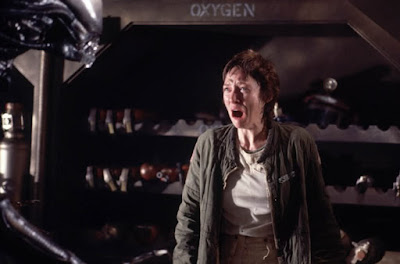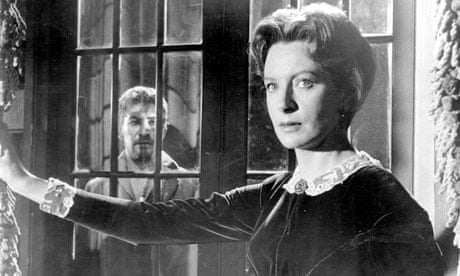Which brings me to Alien. Oh, Alien, one of the most iconic films of all-time, period. Even if you don't care for cinema at all, period, you'll still be aware of that incredibly memorable chestburster scene. You'll know the gist of the plot, about yes, an alien who attacks and picks off crew members one by one. It's no spoiler to say that Ripley (Weaver) is the only one who survives - as I've mentioned, the whole subsequent series focusing on her is one of the most well-known sci-fi franchises of all-time. It's endlessly re-watched by many, myself included, and yet even though each time I technically know what's around the corner, so to speak, it still terrifies me with each re-watch.
The nailing of this brooding, tense mood is crucial because the film then transitions to the definition of a slow-burner. Panning shots of the exquisite set design of the commercial spacecraft Nostromo, the spaceship that's going to be the setting for the upcoming events, in an eerily quiet, calm state while the crew are in stasis, allows Ridley Scott to show off the exquisite work of his production crew in constructing the spaceship set. Hundreds of sketches by artists Ron Cobb and Chris Foss were used to plan the labyrinthine ventilation shafts, the pristinely white computer rooms and stasis roomns, the living areas contrasted with the lower levels. The ship manages to have such character of its own with each component, and yet at the same time carrying that sense ofartifice and industrilization that shows that its business is purely business, and that this mission by the crew isn't some daring, wild adventure into outer space, but merely a job.
The style of the sets variate once the crew of the Nostromo, waken up from stasis to check on a distress signal from a nearby planetoid. The planet's design is AMAZING. The film's artistic influence stemmed firstly from the artwork of H.R. Giger, who brings a viscreally organic, lived-in quality to his sets with their stylized biological look, alongside the established style of Scott's direction. It's amazing stuff, and I must say one of the reason the film's as iconic as it is is because of how it looks.
Beyond just looking great, though, the substance to Alien is as evident as the style early on. Ridley Scott's direction, as I've mentioned before in my ranking of his films, holds this film masterfully together as he brings in the human element into the story while wow-ing us with the technical mastery of his craftsmanship. Credit to the excellent screenplay has been frequently debated - Dan O'Bannon wrote the original draft and is credited as such, but the likes of Ronald Shusett, Walter Hill, David Giler etc. also added a great deal/and revised it, including the inclusion of a rather fascinating twist in the third act. Regardless of who claims the most responsibility, it's an incredible screenplay, not least in its writing of its characters who are far from being merely dead meat.
I'll start with Mr Hurt, who plays executive officer Kane, since we all know what happens to him, he having perhaps one of the, if not the, most famous death scenes of all-time. Hurt was coming off his first Oscar nomination for his memorable supporting portrayal of an imprisoned drug addict in Midnight Express, and in the subsequent year would give one of the greatest performances of all-time as John Merrick in The Elephant Man, which he garnered an Oscar nod for as well. For some odd reason he's never been nommed against since, but I digress. In between both those performances, he found the time to take part in the greatest horror film of all-time, and in classic Hurt fashion he makes a huge impact despite being the first member of the Nostromo to be killed off. The casting of Hurt in the role was rather clever on many levels. Always one who looked wiser than his years, having him as the savvy, world-weary veteran of the crew works extremely well in setting him up to be a sort of secondary leader, and having perhaps the most well-known cast member out of the ensemble be killed off first enhances the effect of his death scene. Hurt most importantly delivers in every moment the character is onscreen, swiftly bringing his character from his initial apathy to the mission, to excitement at finding the alien eggs, and finally giving one of the most breathtaking, harrowing depictions of pain onscreen.
The most heartwarming relationship (of which I guess there aren't that many) in the film has to be that between Brett and his buddy, chief engineer Parker (Yaphet Kotto). Kotto and Stanton have fantastic chemistry in there scenes together which enhance both their performances, and really do enliven the film. Kotto is like Stanton, really funny and energizes the film in the right sort of fashion in the opening scenes as the most lighthearted of the lot, routinely cracking jokes and trying his best to enjoy, while always having a slight air of dissatisfaction to his delivery over his relatively miniscule paycheck. Kotto and the script establish Parker as an occasionally abrasive and rather hotheaded sort whose amiable demeanour sometimes crack under being ordered around, or as the film progresses, as the pressure intensifies. One thing I've grown to appreciate more on re-watches is that in many films of this sort, Kotto's character would be very much of the scapegoat, dead meat variety, killed off immediately to make a point. Instead the film gives him more time than you might expect to develop his character, and for a film as chilling and terrifying as this, I actually find with every viewing of the film, that Kotto's reactions to the death of the crewmembers, and his gradual growth into a man less concerned about his own welfare, more about the safety of his fellow crew members, rather moving.
The most straightforward and straight-laced of the crew, so to speak, is Tom Skerritt's Captain Dallas. Skerritt was a fairly well-known and well-established actor at the time with his prominent role in MASH and a string of television and cinematic supporting roles. He has one of the more potentially thankless roles as the decoy 'hero' of the film, but he certainly nails the needed command of the captain alongside the personable attributes of a all around decent guy who the crew respects. One thing I've notcied more on re-watches though, like Kotto, is that Skerritt actually brings a certain flaw to Dallas in his heroism, he's admirable but not always wise and Skerritt plays into the script's realizations of that. He sets up his character to be the hero but is ultimately upended in one of the greatest film sequences of all-time.
Sigourney Weaver, as she always was and always will be, is brilliant in the role of Ripley. It's the least showiest of her performances in the series due to the ensemble nature of the film meaning she's jsut barely lead by virtue of the film's final act focusing almost entirely on her v.s. the Alien. This was Weaver's first substantial onscreen role and boy does she show the mounds and mounds of screen presence she'd continue to utilize over the years. Unlike later films, Ripley here is more of a space officer doing her job, who in some ways appears to be the most cool-headed and professional of the lot. She sticks to procedure and protocol, handles her interactions with each crew member in a rather blunt fashion, and figures out stuff's amiss fairly quickly. This could've made her character boring, especially in contrast to the way the character carries on in the sequels, but Weaver makes Ripley very intriguing to watch onscreen with her naturalistic portrayal of a person who's motto is professionalism, through which she finds ways to survive. She shows hints of the badass yet relatable heroine we get in the later films but within Alien's more horror-based atmosphere finds the right amount of realism to ground that style, and carries the second half of the film incredibly well.
Her dynamic with all the other crew members, especially Kotto and Skerrittt, is particularly great as she brings out even more out of those characters through her interactions with them. Indeed, one of the reasons all the performances and characters in Alien work as well as they do is because of the way they are thrown together. In one contained setting, the script and cast build up a believable camaraderie and chemsitry between them all that makes the horror and sci-fi elements resonate all the more, because they just seem like such human, realistic characters in this setting.
Which brings me to the two wild cards of the film which in terms of both writing and acting, are the biggest risks and biggest payoffs of the film. Vernoica Cartwright and Ian Holm play, respectively, the most and least emotional characters in the film.
Cartwright's Lambert, navigator of the Nostromo, starts off as an adept enough and amiable navigator and ends the film as a complete and utter mess of emotions. Cartwright apparently auditioned for the role of Ripley and only found out when arriving in London for wardrobe fitting that she was to play Lambert. Alien is considered a masterpiece in female writing for characters since all roles in Alien were written as being unisex/interchangeable. This therefore allows for the film to show two female characters who are not 'types' of characters but rather, are characters in themselves. Ripley is not just some badass and Lambert is not a coward, rather she's the crew member most disinclined to take risks, and gets steadily more anxious as the risks build up; her anti-chemistry with Ripley is particularly good in establishing this. Of course the highlight of her performance is indeed the big emotional scenes where she reacts in a terrified fashion to the threat of the Alien, and as Invasion of the Body Snatchers showed, Cartwright is perhaps the greatest onscreen screamer of all-time. The way her character is utilized within the story is great as she's not just some victim, she reflects a very real, palatable sense of horror that evokes itself through her so viscreally, we feel entirely for her, making her character's demise incredibly effective.
As for Holm, won't get into too much detail in case you, my dear reader have yet to see the film, but safe to say it's one of its most intriguing elements, the way his performance and his character plays into the plot...(excellent review of his performance here, http://actoroscar.blogspot.co.uk/2014/07/alternate-best-supporting-actor-1979_5.html).
Having gotten that whole ensemble out of the way, let's talk about how the film is structured. The brooding first act soon gives way to an exhilirating, heart pounding second act, an absolutely terrifying and yet so intriguing transitions into the third act, and the third act itself repeatedly pushes and pulls the carpet from underneath you to shock and release, release and shock.



























